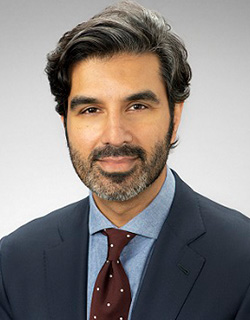Ask an Oncology Expert with Dr. Farzad Masroor
April 14, 2022Dr. Farzad Masroor earned his medical degree from the Medical College of Georgia at Augusta University, where he was elected into the Alpha Omega Alpha medical honor society. He then completed a residency in Internal Medicine at the Hospital of the University of Pennsylvania. He received additional residency training in Otolaryngology-Head & Neck Surgery at the Kaiser Permanente Oakland Medical Center. This was followed by a fellowship in Head and Neck Surgical Oncology and Microvascular Reconstruction at the University of Pittsburgh Medical Center. Dr. Masroor treats head and neck cancer, with expertise in thyroid surgery, head and neck surgical oncology, and microvascular reconstructive surgery.
On Wednesday, March 13, Dr. Masroor discussed thyroid cancer, how we can treat it and who is at risk. He also shared that most thyroid cancers are treatable with surgery, much more so than the other types of cancers he sees daily.
Here are the top takeaways from Dr. Masroor's interview:
- The thyroid is the butterfly-shaped gland that sits on your windpipe. It produces thyroid hormones to control a person's metabolism. Dr. Masroor said there are various genetic diseases that can stem from the thyroid such as Hashimoto's disease and Graves' disease. He also said a person can easily live without their thyroid, thanks to modern medicine. The difference between thyroid cancer and disease is in cancer the cells have escaped the body's control.
- There are three different types of thyroid cancer: differentiated, medullary and anaplastic. Differentiated is the least lethal and most common. It is easily treatable and usually found incidentally while scanning the upper body, abdomen or head for something else. Medullary is the second most common and grows from "C-cells." The third and most dangerous type is anaplastic thyroid cancer. Dr. Masroor said this is the most rare, effecting only 1% of patients.
- The risk factors for thyroid cancer are not well defined; however, women are 2.5x more likely to develop thyroid cancer than men. Those with a family history, past radiation treatments around the thyroid, or with a thyroid disease should regularly have their thyroid checked by their primary care or a genetics doctor. If a patient notices any bumps or lumps near the thyroid gland, Dr. Masroor recommends getting it checked.
At GBMC, patients receive university-level care in a community hospital setting. Dr. Masroor believes the leadership team at GBMC is always looking for ways to do things better and improve patient care. Dr. Masroor is passionate about his work and his patients, and believes they deserve the best care possible. He, along with the rest of the oncology team, are currently working to consolidate cancer services into one convenient location, The Sandra R. Berman Pavilion.



